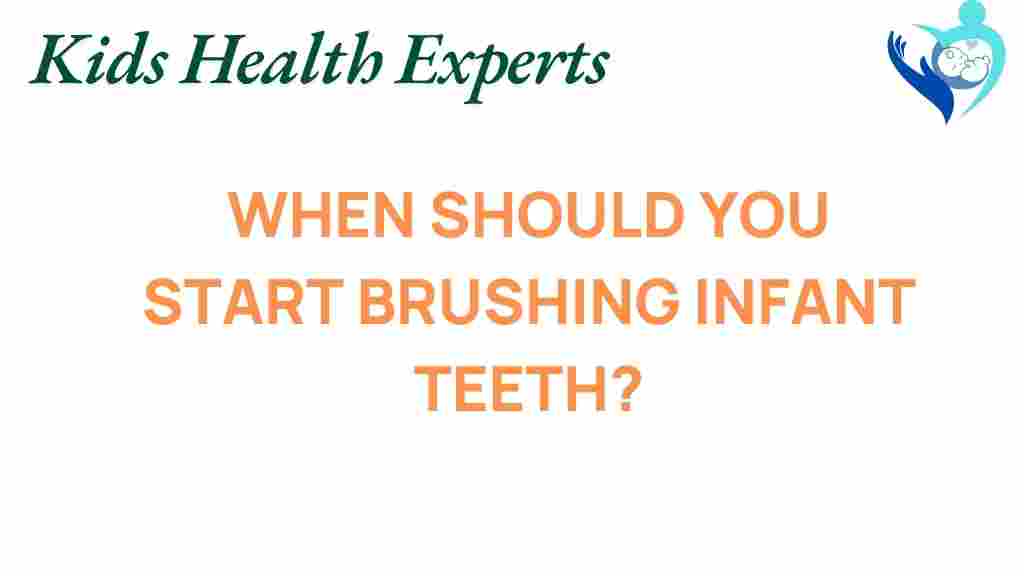When Should You Start Brushing Infant Teeth? A Guide for New Parents
As a new parent, you’re likely overwhelmed with the myriad of responsibilities that come with caring for your little one. One crucial aspect of infant dental care that often gets overlooked is the importance of establishing a good oral hygiene routine early on. Understanding when and how to start brushing your infant’s teeth can set the foundation for a lifetime of good dental health. In this guide, we will break down the essentials of brushing teeth for infants, providing you with the knowledge needed to promote optimal oral hygiene for your child.
The Importance of Infant Dental Care
Infant dental care is vital for several reasons:
- Baby teeth, or primary teeth, play an essential role in the development of your child’s speech.
- They help guide the permanent teeth into position.
- Good oral hygiene can prevent cavities and gum disease early in life.
- Establishing healthy habits early on can lead to a lifetime of good oral hygiene.
As you navigate through the early stages of child care, it’s important to remember that dental health starts before the first tooth emerges.
When to Start Brushing Teeth
Many new parents wonder when they should begin brushing their infant’s teeth. The American Academy of Pediatric Dentistry recommends starting oral hygiene as soon as the first tooth erupts, which typically occurs around six months of age. However, you can begin caring for your infant’s mouth even before teeth appear.
Step-by-Step Process for Brushing Infant Teeth
Here’s a simple guide to help you establish a brushing routine for your infant:
1. Start Early
Before your baby’s teeth come in, you can begin cleaning their gums. Use a soft, damp washcloth to wipe their gums after feeding. This helps remove any leftover milk and establishes a habit of oral hygiene.
2. Choose the Right Toothbrush
Once your baby’s first tooth appears, it’s time to introduce a toothbrush. Choose a soft-bristled toothbrush designed for infants. These brushes are gentle on tiny gums and fit comfortably in their mouths.
3. Use the Right Toothpaste
Use a fluoride-free toothpaste specifically formulated for infants. A smear or rice-sized amount is sufficient for their small mouths. Make sure to avoid any toothpaste that contains fluoride until your child is about two years old, as they might swallow it.
4. Establish a Routine
Try to brush your infant’s teeth twice a day, ideally in the morning and before bedtime. Making it a routine will help your child become accustomed to brushing their teeth.
5. Make it Fun
Engage your baby by making brushing a fun activity. Sing songs, or let them choose their toothbrush. Making it enjoyable will encourage a positive association with oral hygiene.
6. Monitor Their Brushing
As your child grows, they will want to brush their own teeth. However, it’s essential to supervise and assist them until they are about 7 or 8 years old, ensuring they are brushing properly.
Common Concerns and Troubleshooting Tips
As you begin brushing your infant’s teeth, you may encounter some common challenges. Here are some solutions:
- Resistance to Brushing: If your baby resists brushing, try making it a game or offering a toy to hold while you brush.
- Teething Discomfort: If your child is teething, they may be more sensitive. Use a cool teething ring or a chilled washcloth before brushing to soothe their gums.
- Gag Reflex: If your child gags when brushing, make sure you are using a small toothbrush and not pushing too far back in their mouth.
- Fear of the Toothbrush: Let your child explore the toothbrush without any pressure. Allow them to play with it to get used to it.
If you continue to have concerns about your infant’s oral hygiene or dental health, it’s always a good idea to consult with a pediatric dentist. They can provide personalized advice and recommendations for your child’s specific needs. You can find more information about pediatric dentistry by visiting this resource.
Conclusion
Starting a dental care routine for your infant may seem daunting, but it’s a crucial aspect of child care that will pay off in the long run. By beginning to brush as soon as the first tooth erupts and establishing a consistent routine, you can help promote excellent dental health for your child. Remember, good oral hygiene habits formed early in life can lead to a lifetime of healthy smiles. As a new parent, embrace this opportunity to nurture your child’s oral health and ensure they have a bright future filled with confident smiles!
For more information on infant dental care, check out this informative article that covers additional tips and resources.
This article is in the category Care and created by KidsHealthExperts Team
